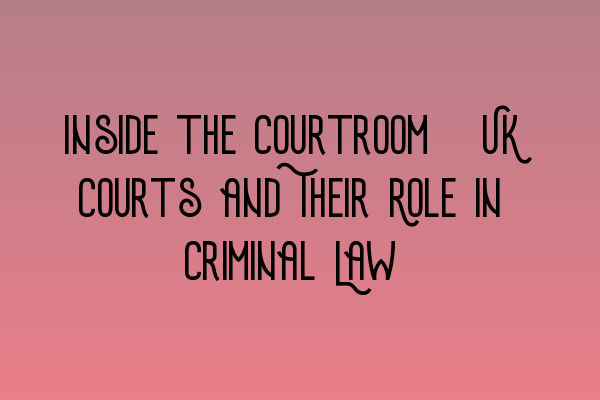Inside the Courtroom: UK Courts and Their Role in Criminal Law
Welcome to SQE Criminal Law & Practice Law UK, the leading experts in criminal law across the United Kingdom. In this blog post, we will take you on a journey inside the courtroom and explore the crucial role of UK courts in the realm of criminal law.
The Structure of UK Courts
The UK court system is comprehensive and consists of different levels, each with its own jurisdiction and responsibilities. The hierarchy starts with the Magistrates’ Court, which deals with minor criminal offenses and initial stages of more serious cases. The Crown Court, on the other hand, handles more serious criminal offenses, including indictable offenses and complex trials.
Depending on the severity of the crime, cases may further escalate to the Court of Appeal or even the Supreme Court. These higher courts primarily focus on reviewing decisions made in lower courts, ensuring justice is upheld and the correct application of the law is maintained.
The Role of UK Courts in Criminal Law
UK courts play a fundamental role in the administration of justice. They operate based on the principles of fairness, impartiality, and the rule of law. Their primary functions include:
- Adjudication: UK courts provide a neutral forum where criminal cases are tried, evidence is presented, and guilt or innocence is determined. The judge presides over the proceedings, ensuring a fair trial for all parties involved.
- Sentencing: If the defendant is found guilty, UK courts have the authority to impose appropriate sentences based on the severity of the offense and relevant legislation. Sentencing decisions consider factors such as the nature of the crime, the defendant’s criminal history, and any mitigating or aggravating circumstances.
- Appeals: UK courts serve as the final arbiter of justice. The Court of Appeal and the Supreme Court review cases to ensure that the correct interpretation and application of the law have been followed. Appeals provide an opportunity to rectify any errors or injustices that may have occurred during the trial process.
Key Players in the Courtroom
The courtroom is a dynamic environment involving various professionals working together to ensure the smooth functioning of the justice system. Some of the key players include:
- Judge: The judge has the authority to make decisions, maintain order, and interpret the law during the trial. Their role is crucial in ensuring a fair trial and applying the law correctly.
- Prosecutor: The prosecutor represents the state and is responsible for presenting the case against the defendant. They gather evidence, interview witnesses, and argue for a conviction.
- Defense Counsel: The defense counsel represents the defendant and safeguards their rights throughout the trial. They challenge the prosecution’s case, cross-examine witnesses, and present a defense strategy to secure an acquittal or mitigate the sentence.
- Jury: In some cases, a jury is present to provide an impartial assessment of the evidence presented. They play a crucial role in determining guilt or innocence, as well as assisting with sentencing decisions.
These key players work together to ensure a fair trial, uphold the principles of justice, and protect the rights of all individuals involved in the criminal justice system.
Conclusion
In conclusion, UK courts are the cornerstone of the criminal justice system, playing a vital role in administering justice and upholding the rule of law. Their structure, functions, and key players all contribute to the fair and effective resolution of criminal cases. To stay updated with the latest developments in criminal law and practice in the UK, be sure to explore our SQE 1 Preparation Courses and SQE 2 Preparation Courses. Stay tuned to our latest SRA SQE Exam Dates to plan your preparation accordingly. Also, check out our comprehensive SQE 1 Practice Exam Questions and SQE 1 Practice Mocks FLK1 FLK2 to enhance your knowledge and test your understanding. Remember, knowledge is power, especially in the realm of criminal law.
